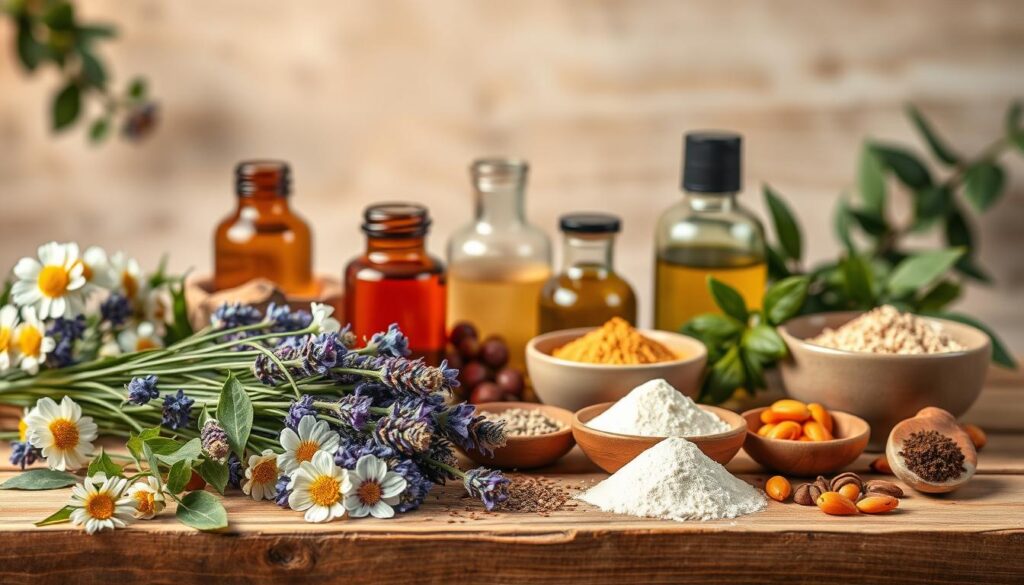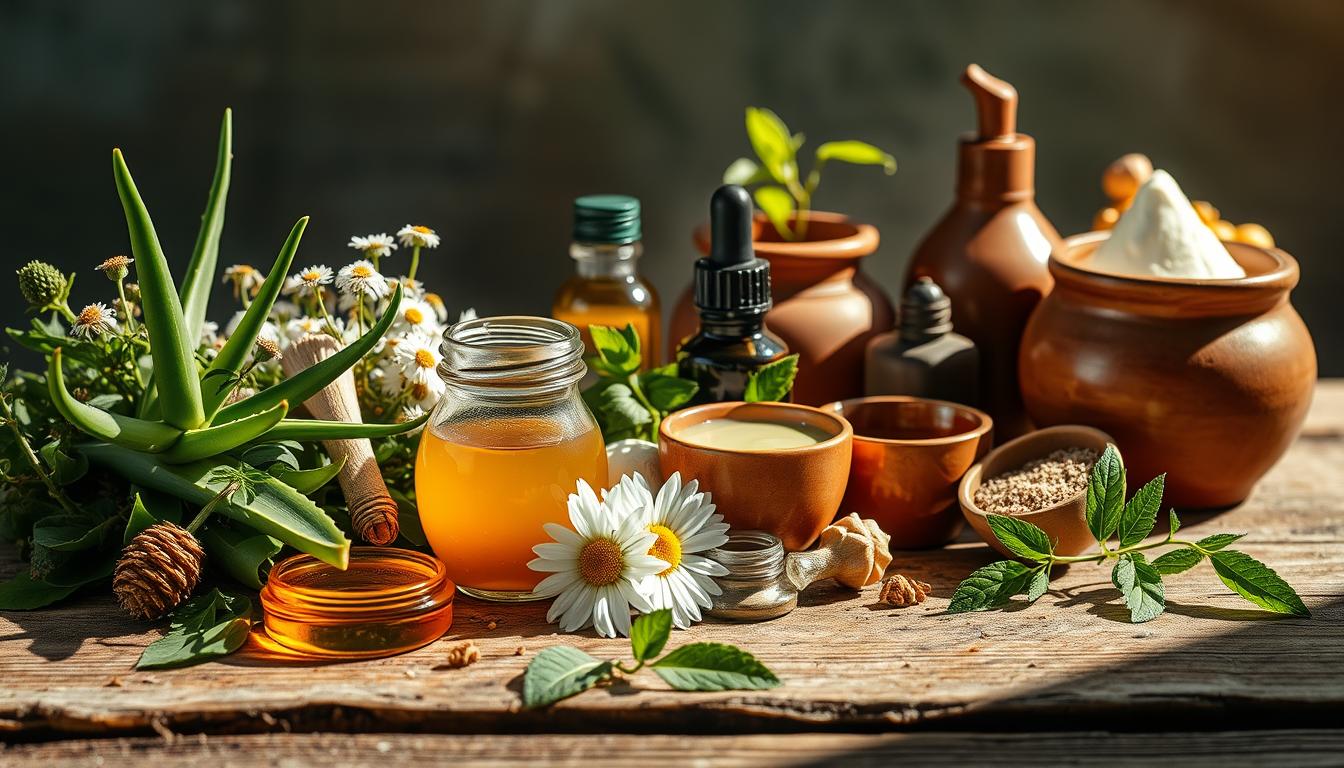Starting a journey for clear skin solutions can be a trial-and-error process. It’s important to understand what your skin needs. With so many skincare treatments out there, finding the right one for your skin can be tough. But, there’s help available.
This guide will share tips and remedies backed by dermatologists. We’ll explore how to tackle common skin issues. Whether it’s natural remedies or scientific research, we’ll cover it all.
Every person’s skin is different, shaped by their lifestyle, genes, and health. This guide offers personalized advice for acne, dryness, oil balance, and more. We’ll also look at aging, eczema, psoriasis, and rosacea. Our goal is to help you find the best skincare for your skin’s needs.
Key Takeaways
- Understanding specific skin issues is key to finding the right treatments.
- Combining natural and scientific solutions leads to effective clear skin.
- What you eat and how you live affects your skin’s health.
- Dermatologists recommend treatments for all skin types, including sensitive and aging skin.
- Knowing about skin conditions like eczema and psoriasis helps in finding the right treatment.
Natural Solutions for Acne Management

Looking into natural acne remedies is a soft yet powerful way to handle acne. Learning about ingredients like tea tree oil, honey, and green tea can change how we fight acne. Studies show they help make skin clear and healthy.
Tea Tree Oil Application
Tea tree oil for skin is a known natural acne fighter. It targets the bacteria that cause acne. To avoid irritation, mix it with a carrier oil before use.
Honey and Cinnamon Mask
The honey mask is great for acne-prone skin because of its antibacterial and anti-inflammatory effects. Adding cinnamon makes it even better at reducing inflammation and fighting acne-causing bacteria. Apply it to the affected areas and rinse after a few minutes for a good acne treatment.
Green Tea Rinse
Using green tea skincare can greatly improve your skin’s health. Green tea’s antioxidants, like catechins, help reduce sebum and fight inflammation. A simple green tea rinse can calm your skin and stop acne breakouts.
Moisturizing Secrets for Dry Skin Relief
Discovering the best moisturizers and dry skin remedies can make your skin softer and healthier. Using hydrating skincare methods helps fight dryness and improves skin texture. We’ll explore how the right products and habits boost skin health.
Choosing the Right Moisturizer
It’s key to know your skin type when picking moisturizers. For very dry skin, choose products with hyaluronic acid and ceramides. These ingredients lock in moisture and fix the skin barrier, giving lasting hydration.
Hydration from Inside Out
Keeping your body hydrated is just as important as your skin. Drinking at least eight glasses of water a day and eating water-rich foods like cucumbers and oranges helps. This boosts your skin’s moisture, improving overall health.
Overnight Deep Moisturizing Treatments
Adding overnight skincare to your routine boosts moisture absorption. Use night-specific products that deeply nourish your skin while you sleep.
| Product | Key Ingredient | Type | Benefit |
|---|---|---|---|
| Night Repair Cream | Peptides | Cream | Reduces fine lines |
| Hydrating Oil Blend | Argan Oil | Oil | Boosts elasticity |
| Intensive Hydrating Mask | Aloe Vera | Mask | Soothes dry skin |
To really help dry skin, mix high-quality overnight skincare with internal hydration strategies. Tailoring your skincare routine with these tips will keep your skin looking vibrant and healthy.
Effective Strategies to Combat Oily Skin
Managing oily skin needs a steady effort. It involves using proven ingredients and certain skincare habits. Clay masks and witch hazel are key in keeping your skin balanced and oil-free.
Clay masks benefits are many, helping those with too much oil. Kaolin and bentonite clays soak up oil, reducing shine and preventing pimples. They also make pores smaller, giving your skin a smoother feel.
Witch hazel is also great for oily skin. It tightens pores and controls oil, making it perfect for toners and cleansers for oily skin.
Table: Comparing Clay Masks and Witch Hazel for Oil Control
| Aspect | Clay Masks | Witch Hazel |
|---|---|---|
| Oil Absorption | High | Moderate |
| Pore Minimization | Yes | Yes |
| Main Ingredient Types | Kaolin, Bentonite | Distilled Witch Hazel |
| Typical Use | Facial masks | Toners, cleansers |
| Benefits | Detoxifies, exfoliates | Soothes, reduces inflammation |
Adding clay masks and witch hazel to your skincare routine can greatly improve your skin. They fight excess oil, leading to better-looking skin. Using them regularly is key to solving oily skin problems.
Anti-Aging Remedies for Youthful Skin
As we get older, our skin has less power to fight off UV damage and toxins. Modern dermatology has found ways to help our skin look younger. Using products with retinol, vitamin C, and sunscreen can make a big difference in how our skin looks and feels.
Retinol-based Products
Retinol, a vitamin A derivative, helps skin cells renew faster and makes skin look smoother. It boosts collagen and reduces wrinkles. Start using retinol products slowly to avoid skin irritation.
Vitamin C Serums
Vitamin C is key for fighting aging. It’s a strong antioxidant that helps skin repair itself. Using vitamin C serums daily can make your skin look brighter and more even-toned.
Sunscreen: The Ultimate Anti-Aging Tool
Sunscreen is essential for protecting your skin from UV rays. These rays can cause early aging and skin cancer. Use a broad-spectrum sunscreen with at least SPF 30 every day to keep your skin looking young.
These three elements work together to fight aging. Retinol, vitamin C, and sunscreen protect and restore your skin. They help keep your skin looking smooth, firm, and healthy as you age.
Managing Sensitive Skin Problems
People with sensitive skin often face irritation, redness, and discomfort. The solution is a skincare routine focused on gentle cleansing and hypoallergenic products. This approach not only calms the skin but also protects it from irritants.
When picking cleaners for skincare for sensitive skin, look for products without harsh chemicals or fragrances. Glycerin, aloe vera, and ceramides help keep the skin moist without irritation. It’s important to avoid soaps with alcohol, sulfates, and synthetic dyes to prevent worsening skin sensitivity.
Dermatologists often suggest Cetaphil’s Gentle Skin Cleanser. It cleanses well without taking away the skin’s natural oils.
Essential Tips for Sensitive Skin Care
Good skin care is more than just the right cleanser. It’s about understanding how to care for the skin’s barrier and avoid harmful elements:
- Avoid long hot showers as they can strip the skin of essential oils.
- Opt for hypoallergenic products to minimize the risk of reactions.
- Test new skincare products by applying a small amount to a patch of skin before using it regularly.
- Protect your skin with a broad-spectrum sunscreen designed for sensitive skin care.
- Frequently moisturize to lock in hydration and form a protective barrier against environmental irritants.
Following these tips can help manage sensitive skin symptoms. This leads to healthier, more comfortable skin.
Skin problems: Addressing Eczema, Psoriasis, and Rosacea
Many people struggle with chronic skin conditions that affect their comfort and mood. We will explore ways to find relief from eczema, manage psoriasis, and treat rosacea. Our goal is to offer support and advice to those facing these challenges.
Eczema causes itchy, inflamed skin. Using advanced emollients and topical treatments can help. Psoriasis management often includes topical corticosteroids and biologic therapies. For rosacea, managing triggers and using gentle skincare routines are key, along with topical and oral medications.
It’s important to understand these conditions beyond just their symptoms. Knowing the best treatments can help alleviate discomfort and improve skin health. Below, we compare the main treatments for each condition:
| Condition | Topical Treatments | Systemic Treatments | Lifestyle Adjustments |
|---|---|---|---|
| Eczema | Hydrocortisone creams, Moisturizers | Immunosuppressants | Moisture-rich environments, Avoidance of irritants |
| Psoriasis | Corticosteroids, Vitamin D analogs | Biologics, Methotrexate | Dietary changes, Stress reduction |
| Rosacea | Metronidazole, Azelaic acid | Tetracyclines, Isotretinoin | Trigger avoidance (e.g., sun, spicy food) |
This information helps patients and caregivers talk to doctors about managing chronic skin conditions. It guides them toward symptom relief, better skin health, and a higher quality of life.
Conclusion
Dealing with different skin issues can be tough. But, the key to a great skincare routine is understanding and action. It’s not just about what we put on our skin. Our diet, lifestyle, and the right skincare products also play a big role.
Choosing the right habits and treatments is key. But, don’t forget to get advice from a dermatologist if needed. They can guide you to the best treatments and help you create a routine that fits your skin perfectly.
As we wrap up, remember that getting healthier skin takes time and effort. It’s about sticking to good skincare habits, making smart choices, and being patient. Every step you take is a step towards better skin health and confidence. With the right approach, you can make your skin look its best.
FAQ
Q: What natural remedies can help with acne management?
A: Natural remedies like tea tree oil, honey and cinnamon masks, and green tea rinses can help with acne. They have properties that fight bacteria, reduce inflammation, and protect the skin.
Q: How can I effectively moisturize dry skin?
A: To moisturize dry skin, pick the right moisturizer for your skin type. Drink plenty of water to keep your skin hydrated. Also, try overnight treatments with masks or oils.
Q: What are some strategies to combat oily skin?
A: Clay masks can help control oil. Witch hazel balances the skin and helps manage sebum.
Q: Can you recommend anti-aging skincare remedies?
A: Yes, retinol, vitamin C serums, and sunscreen are great for anti-aging. They help skin look younger by speeding up cell turnover, brightening, and protecting from UV rays.
Q: What should I look for in products for sensitive skin?
A: For sensitive skin, choose gentle cleansers and soaps. Look for ingredients that won’t irritate. Also, follow tips for sensitive skin to reduce irritation and strengthen the skin barrier.
Q: How do I address skin conditions like eczema, psoriasis, and rosacea?
A: Each condition needs its own treatment. Eczema needs emollients and topical treatments. Psoriasis is treated with corticosteroids and biologics. Rosacea requires gentle care and medical treatments. Always consult a dermatologist for advice.
Q: Does lifestyle affect skin health?
A: Yes, lifestyle choices like diet, water intake, and sun exposure greatly affect skin health. Eating well, staying hydrated, and protecting from the sun are key to healthy skin.
Q: Should I consult a dermatologist for my skin issues?
A: Yes, getting professional advice is important for treating skin problems. A dermatologist can create a treatment plan tailored to your needs.




